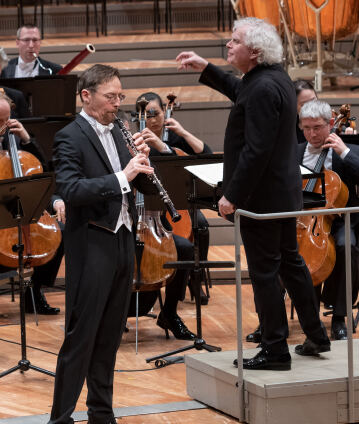Simon Rattle conducts Strauss and Beethoven

In his Oboe Concerto, Richard Strauss magically succeeded in composing in the spirit of Mozart and Schubert without denying his own artistic identity. Simon Rattle performs the work with the Philharmoniker’s principal oboe Jonathan Kelly. He then presents Beethoven’s oratorio Christus am Ölberge, which conveys less spiritual devotion than operatic expressiveness, such as in a dramatically escalating scene depicting the arrest of Jesus.
Flowing melodies characterise the oboe concerto by Richard Strauss, which was premiered in Zurich on 26 February 1946 and is undeservedly rarely performed. The Berliner Philharmoniker present this work under the direction of Sir Simon Rattle. Principal oboist Jonathan Kelly discovered his instrument at the age of eleven because he was inspired by a recording by Lothar Koch (former principal oboist of the Berliner Philharmoniker).
After the interval, another rarely programmed work can be heard: Ludwig van Beethoven’s only oratorio: Christ on the Mount of Olives. Besides the Rundfunkchor Berlin and the soprano Iwona Sobotka, who received international attention as Grand Prize winner of the Queen Elisabeth International Music Competition of Belgium in 2004, tenor Benjamin Bruns and British baritone David Soar will also sing.
The successful premiere of Beethoven’s oratorio took place during “Tempora sacrata” (Lent) on 5 April 1803 at an Academy Concert at which his Second Symphony and his Third Piano Concerto were also presented to the public. The libretto, which draws a very human picture of Jesus, comes from Franz Xaver Huber, a well-known Viennese opera librettist of the time.
The text in free verse invokes all four Gospels and consists of the short scene in the garden of Gethsemane in which Jesus in deep despair asks for strength to bear the afflictions that are impending. The appearance of an angel providing solace (Seraph), only briefly mentioned in the Gospel of Luke, plays a key role in the first part of the oratorio text, while other central Biblical episodes are disregarded. In the second part, the action escalates dramatically with the arrest of Jesus, finally erupting in the cathartic and expansive choral jubilation of the angels: “Welten singen Lob und Ehre dem erhabnen Gottessohn” (“Halleluiah unto God’s almighty son”). The libretto, the critic from the Allgemeine musikalische Zeitung wrote on the occasion of the work’s printing, has given “the composer abundant opportunity to express a variety of lively and deep feelings, so that the whole also contains a rare richness, a great fullness, much variation, and an interest that never wavers, but on the contrary rises ever higher and higher.”
© 2020 Berlin Phil Media GmbH
Related interviews
Artists
Our recommendations
- Simon Rattle conducts Beethoven’s “Pastoral” Symphony and Modernist concertos
- Simon Rattle and Magdalena Kožená at the Waldbühne
- Simon Rattle conducts “Pictures at an Exhibition” at the 2007 New Year’s Eve Concert
- Simon Rattle conducts Ginastera and Britten
- Season opening 2011: Simon Rattle conducts Mahler’s Seventh Symphony
- A Brahms evening with Sir Simon Rattle and Lars Vogt